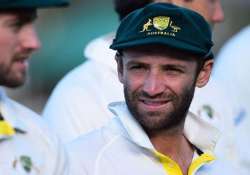Hughes condition was "incredibly rare", says Aus Team doctor
Sydney: The "incredibly rare" condition that took Phillip Hughes' life has only been reported 100 times in medical history and only the second time caused by a cricket ball, according to Australian team doctor Peter

Sydney: The "incredibly rare" condition that took Phillip Hughes' life has only been reported 100 times in medical history and only the second time caused by a cricket ball, according to Australian team doctor Peter Brukner.
An emotional Brukner said the 25-year-old Hughes suffered an vertebral artery dissection after a cricket ball struck his neck during a Sheffield Shield match in Sydney on Tuesday.
The blow caused Hughes' vertebral artery, one of the main arteries leading to the brain, to compress. That caused the artery to split and Hughes experienced a "massive bleed into his brain".
"I think in this instance, this was a freakish accident because it was an injury to the neck that caused a haemorrhage in the brain," Brukner was quoted as saying by 'Sydney Morning Herald'.
The condition that killed Hughes had happened just once before due to a cricket ball, Brukner said.
"The condition is incredibly rare. It's called vertebral artery dissection leading to subarachnoid haemorrhage, if you look in the literature there are only about 100 cases ever reported," he said, adding that the injury was often immediately fatal.
The head of trauma at St Vincent's Hospital, Doctor Tony Grabs, also described Hughes' injury as "very rare, very freakish", saying such a condition had never been treated at the hospital before.
Grabs said Hughes' injury was "catastrophic" and after an immediate scan to assess his injuries, doctors decided they needed surgery to relieve the pressure on his brain.
"What sometimes happens in the brain is if you put blood around the brain, a small amount, you will start to become a bit drowsy. If you put a lot of blood around the brain you will become unconscious," Grabs said.
"He went to theatre and had extensive surgery to remove some of the scull around the brain to help allow the brain to expand so it wasn't compressed," he said.
The surgery took about one hour and 20 minutes. Hughes was then placed in an induced coma in intensive care so he could recover but over the next 48 hours "did not make very much improvement".
Asked about a reported delay in ambulance response, both doctors praised the treatment Hughes received on the field and said he arrived at hospital in a good condition.